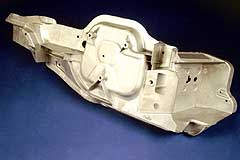
Alcoa announced today that it has provided automotive aluminum structural technology to Audi AG, the German automaker, for its second-generation A8 sedan. Alcoa's automotive structural technology in the A8 offers drivers outstanding stability and sets new standards in safety performance, while maintaining one of the automotive industry's lightest luxury sedan body shells.
According to Audi, its new A8 achieves "maximum stability with minimum mass" through the effective integration of multiple aluminum product forms supplied by Alcoa from its manufacturing facility in Soest, Germany.
"Alcoa's work with Audi in the application of aluminum to strengthen the performance of an integrated body structure system represents nothing less than revolutionary progress in automotive design and manufacturing that began with our collaborative, pioneering efforts on the original A8," according to Rick Milner, president of Alcoa Advanced Transportation Systems.
"The functional integration capabilities provided by the complex designs and part geometries of Alcoa's high-strength, ductile die castings and partially-hydroformed extrusions were also instrumental in stiffening the space frame structure on the new A8 to improve its handling and safety performance. The presence of Alcoa's newest cast and extruded components also facilitated the use of more automated assembly techniques to help Audi manage their production costs," according to Milner.
Audi's new aluminum space frame features fewer components than its predecessor...267 versus 334. Newly-designed, larger and more complex Alcoa Vacuum Die Castings have replaced combinations of castings, extrusions and sheet components used in the original space frame to consolidate parts and reduce total systems cost.
The new A8 also features other "firsts" in the use of Alcoa's proprietary casting technologies. Four AVDC castings are used in the doors. The luxury sedan also represents the first application of a new Alcoa casting alloy that does not require water quenching after heat treatment.
From a manufacturing perspective, Alcoa's Soest facility met all of Audi's delivery performance targets throughout the launch of the A8. This was a significant challenge since the ramp up to series production included a 33% expansion in the size of the location, featuring the addition of two new vacuum die casting machines, a significant expansion of the plant's shipping and receiving area and expansion of the location's prototyping capability, including new measurement, fixturing, testing and assembly facilities.
"The addition of these capabilities, in combination with the experience of launching the first A8 and our on-going close cooperation with Audi, allowed us to manage the ramp up of the new model and manage costs at the same time. We were able to take advantage of the stability of our work force and involve employees who had participated in the first A8 launch. This combination of experience and resources created significant advantage for Audi and Alcoa," according to Luigi Mattina, Soest's plant manager.
The wide variety of Soest's processing capabilities...from vacuum die casting to extrusion forming to hydroforming...coupled with the plant's expanding knowledge of prototyping, fixturing, joining and assembly...make it one of Alcoa Advanced Transportation System's most versatile operations. "We now have almost 10 years worth of experience in helping our customers go from concept to prototype to pre-series to series products," Mattina concluded.




